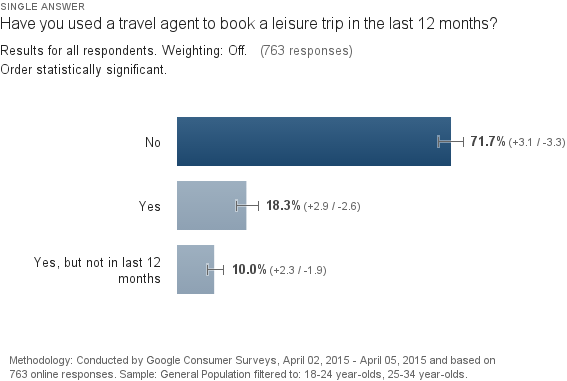British Millennials Use Travel Agents at Twice the Rate of Americans

Skift Take
 Over this year, we are doing a series of consumer surveys at regular intervals that probe various travel habits and nuances of millennials.
Over this year, we are doing a series of consumer surveys at regular intervals that probe various travel habits and nuances of millennials.
Third in this Travel Habits of Millennials 2015 series is a question we asked in the first survey, but aimed this time at the millennials in the UK: “Have you used a travel agent to book a leisure trip in the last 12 months?”
This question was posed to about 750+ British millennials earlier this month, using Google Consumer Surveys.
The topline answer, in keeping with the still relatively-larger popularity of packaged travel and travel agents in UK: Almost 20 percent of millennials said yes, they had used a traditional travel agent in the last year.
Another 10 percent said they did so prior to that last year's window. A full 70+ percent of British millennials haven’t used a travel agent at all while booking their travels.
This is almost double the use-ratio of American millennials, which stands at about 10 percent in the last year, according to our survey results last month.
Digging a bit deeper in the demographics of our survey:
- Along the male-female divide, slightly more British female millennials have not used travel agents at all, 75 percent, compared to about 69 percent of males.
- Interestingly, similar to the American data, the younger millennials (18-24 year olds) have used travel agents more in the last 12 months than the older 25-34 year old millennials in UK: 20.6 percent vs. 15.4 percent.
- As for the regions within UK, the Welsh millennials are the least likely to use travel agents compared to England, Northern Ireland, and Scotland.
- North Ireland millennials are much more likely to use traditional travel agents than other parts of UK, our survey data shows.
Important: This online survey — not served to Skift users — was administered to about 750+ members of the U.K. adult internet population, in the age range 18-34, in the first week of April 2015, through Google Consumer Surveys. The methodology is explained here.






